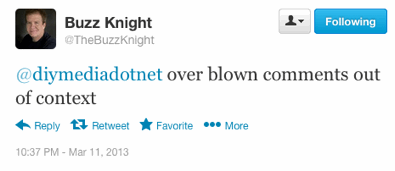Radio Ink publisher Eric Rhoads penned a frantic and strident report following the magazine’s annual ConVergence Radio Conference earlier this month in which he warns of radio’s impending extinction in vehicles.
On the stage were three representatives of the automotive industry: one from Gartner Research…one from the Silicon Valley offices of General Motors…and one who represents an industry association for the connected car. They were on a panel moderated by Buzz Knight of Greater Media, and they talked about the direction of in-car experiences, the digital dashboard, and what will be coming next to the dash of the car….Then, suddenly, this statement was heard:
"AM and FM are being eliminated from the dash of two car companies within two years and will be eliminated from the dash of all cars within five years."
You would think this would be big news…if it were true. But is it true?
The report itself is not the strongest piece of journalism Radio Ink‘s ever published. The dateline is wrong, none of the panelists’ names are given, and none of the quotes are specifically attributed.
I asked for verification from Buzz Knight, Greater Media’s Vice President for Program Development, via Twitter. He’s the only person Rhoads mentions by name in his story.

Rhoads insinuates that General Motors (and Chevrolet in particular) are on the ditch-radio frontier – a statement Knight says is "not true." Although Radio Ink has posted conference highlights to its YouTube channel, there’s nothing in those clips to substantiate this report.
So what do we really have here?
Radio Ink‘s worries about radio’s loss of relevancy, especially in the car, are valid. It’s a fact that streaming broadband is coming to vehicles – though it’s really been there for as long as people could tether smartphones to the dashboard. That is fundamentally changing media consumption practices on the road. It is also true that automakers work on a multi-year development cycle, so decisions on what to include in new vehicles have already been made.
But just what do automakers gain by removing radio as an infotainment option? Relative to the cost of development and construction, radio is a cheap feature to add and does have some utility, especially in emergencies when wireless broadband networks fail and radio stations remain on the air.
Rhoads also suggests that if radio remains in the car, it will only be via HD: "Whether these same companies will still offer HD Radio needs to be addressed — it may or may not be part of their plans. If it is, you’ll be forced to upgrade to HD to reach people in new cars."
This won’t happen. HD technology doesn’t work that way. The HD receiver system is designed to work with both analog and digital radio signals. There’s no margin – and no reason – to separate one from the other in the receiver system.
That said, it’s not like HD is catching fire, in vehicles or elsewhere. Arbitron recently reported that FM-HD multicasts reach a whopping 3.6 million people per week, or 1.5% of the overall U.S. radio audience. If automakers were to ditch radio because they consider it unpopular, they wouldn’t keep just HD.
Radio is likely to remain in the dashboard for the foreseeable future, though it’s certainly not out of the realm of possibility for specific automotive models with specific option levels to go without. Whether radio remains a regularly-used infotainment option among the growing plethora of choices that now exist is a whole other matter.